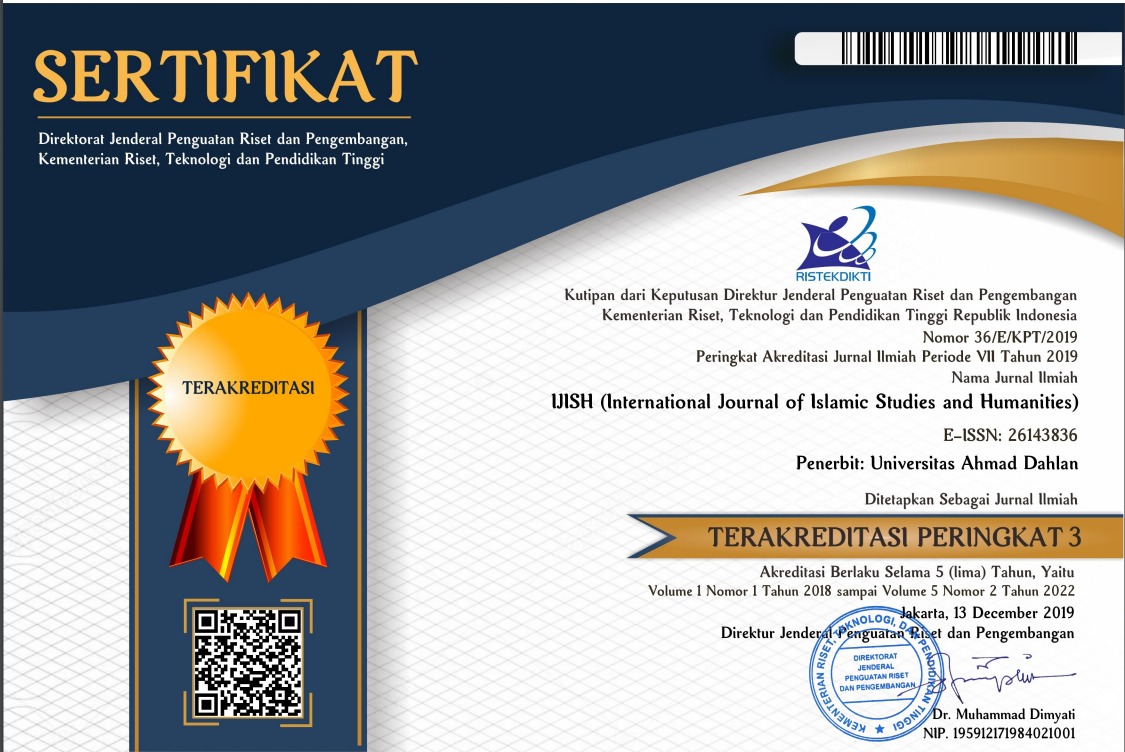The Concept of Justice in Islam According to Majid Khadduri
DOI:
https://doi.org/10.26555/ijish.v5i1.4896Keywords:
Islamic theology, Procedural justice, Natural justiceAbstract
This paper aims to describe the concept of justice in Islam according to Majid Khadduri, a Muslim scholar in the modern era. In Islamic theology, for example, justice is not only related to aspects of humanity but also divinity. In the secular sciences, justice is widely discussed in terms of substance and procedure. Likewise, in the discourse of Islamic theology, the value in question tends only to divinity, meaning that the measure of good value is God or the texts of the holy book. However, for Majid Khadduri, these values are not only related to humanity but at the same time they must be close to what God wants and religion in general. The synthesis of the two views above seems to be united in the concept of Khadduri. Therefore, the problem in this paper is how the construction of justice according to Majid Khadduri and its implications for the formulation of justice in the context of religious humanity. The results of the study show that human actions are judged fairly if they are based on correct norms and carried out with good procedures. In addition, with the development of social problems in society, such as injustice, it is also important to formulate the concept of justice which truly is a concept that can provide and be useful in solving this sense of injustice. This article will contribute and can be used as an approach in creating the spirit of changing, enlightening in Muslim society.
References
Ceric, M. (1995). Root of Synthetic Theology in Islam, A study of Theology Abu Mansur al Maturidi (d333/944. ISTAC.
Harun Nasution. (1972). Teologi Islam, Aliran-Aliran Sejarah Analisa Perbandingan. UI Press.
Hasanuddin, I. (2018). Keadilan Sosial: Telaah atas Filsafat Politik John Rawls. Refleksi, 17(2), 193–204. https://doi.org/10.15408/ref.v17i2.10205
Havis Aravik & Choiriyah. (2018). Etika Rasionalisme Versus Etika Voluntarisme; Studi Kritis Mu’tazilah dan Asy’ariyah. Salam: Jurnal Sosial Dan Budaya Syar-I, 6(1), 17.
https://en.m.wikipedia.org/wiki/Majid_Khadduri. (n.d.).
https://law.yale.edu/justice-collaboratory/procedural-justice. (n.d.).
Ira Alia Maeran. (2018). Hukum Pidana & Pidana Mati. Unissula Press.
Khalid Bin Ismai. (2010). Islam and the Concept of Justice. Jurnal Intelek, 5(13(7)), 1–12.
Khan, D. (2017). Mutazilaism: An Introduction to Rationality in Islam. International Journal of Engineering and Applied Sciences, 4(10), 257359.
Koerniatmanto Soetoprawiro. (2010). Keadilan sebagai Keadilan (justice as fairness). Jurnal Hukum Pro Justisia, 28(2), 231.
Majid Khadduri. (1984). The Islamic Conception of Justice. The Johns Hopkins Press Ltd.
Majid Khadduri. (1999). Teologi Keadilan Perspektif Islam (Translatio). Risalah Gust.
Palmer, C. F. (2009). SHAKESPEARE MEETS SOCIAL JUSTICE Incorporating Literature in the Social Justice. In K. W. Skubikowski (Ed.), Social Justice Education, Inviting Faculty to Transform Their Institutions (p. 164). Stylus Publishing.
Pan Mohamad Faiz. (2009). Teori Keadilan John Rawls. Jurnal Konstitusi, 6(1), 140.
Rawls, J. (1971). A Theory of Justice. Oxford University Press.
Rohidin. (2018). Mu’tazilah : Sejarah Dan Perkembanganny. El-Afkar, 7(11), 1–10.
Shamrahayu, A. A. and A. O. S. (2012). Right to Equality and Justice under International Islamic Instruments and the Shari‛ah: An Evaluation. Australian Journal of Basic and Applied Sciences, 6(11), 223–232.
Toosi, J. F. (2020). The Ashari Theological School and the Authority of Human Reason in Ethics. ICR Journal, 11(1), 110–125. https://doi.org/10.52282/icr.v11i1.26
Downloads
Published
How to Cite
Issue
Section
License
Copyright (c) 2022 Sangkot Sirait

This work is licensed under a Creative Commons Attribution-ShareAlike 4.0 International License.
Authors who publish with IJISH (International Journal of Islamic Studies and Humanities) agree to the following terms:
- Authors retain copyright and grant the journal right of first publication with the work simultaneously licensed under a Creative Commons Attribution License (CC BY-SA 4.0) that allows others to share the work with an acknowledgment of the work's authorship and initial publication in this journal.Â
- Authors are able to enter into separate, additional contractual arrangements for the non-exclusive distribution of the journal's published version of the work (e.g., post it to an institutional repository or publish it in a book), with an acknowledgment of its initial publication in this journal.
- Authors are permitted and encouraged to post their work online (e.g., in institutional repositories or on their website) prior to and during the submission process, as it can lead to productive exchanges, as well as earlier and greater citation of published work.

This work is licensed under a Creative Commons Attribution-ShareAlike 4.0 International License.






